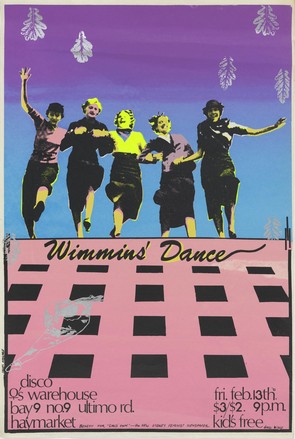Wimmins' Dance, Benefit for Girls' Own, the New Sydney Feminist Newspaper
Silkscreen print on paper, Wimmins’ Warehouse Screen-printers
PXD 673/26
Purchased 1994
The Wimmins’ Warehouse Screen-printers created posters showing women as mothers, workers, writers and friends. The warehouse was run as a women’s collective from 1979 to 1981 in a five-storey warehouse in Sydney’s Haymarket area. An unofficial headquarters for the social and cultural activity of the Women’s Liberation Movement, the warehouse applied the values of feminism, equality and collectivism to all creative output which extended throughout the ensuing decades into a broad range of women’s activities. This was especially true of the Wimmins’ Warehouse Screen-printers and Girls’ Own newspaper collectives, which produced artworks and published articles without creators’ names.
The Library’s poster
archive shows the emerging political voice of Australia's women’s movement
through poster art. The collection shows how the decorative style of poster art
was used to actively communicate information to a mass audience and as a
political tool highlighting social issues.
Coinciding with the
election of the Whitlam government in 1972 – spurred on by feminism and the
anti-war movement – collectives and community-based groups formed to encourage
women to participate in the women's movement. Ethics of feminism, collectivism,
equality and working art extended from these early groups into second wave
feminist activism.
Poster art has evolved
significantly from the earliest posters produced in Australia, printed in the
early 19th century and featuring text only, to those created in Sydney during
the 1970s and 1980s. Posters produced by the Women's Warehouse Collective
(1979-1981) were characterised by bold designs and effective use of
photographic and graphic screen print techniques. They act as visual time
capsules that answer many questions posed by today's young women.
The 1970s resurgence of printmaking
in Australia emerged as a consequence of Gough Whitlam's Labor government
abolishing tertiary education fees and introducing Advanced Colleges of
Education. More training opportunities for artists from different
socio-economic backgrounds brought a range of different perspectives to contemporary
art.
Screen-printing was
understood as a powerful political tool. Among those who learned to
screen-print in feminist and political groups, there was a shared understanding
of the need to pass on this valuable tool. The Wimmins Warehouse Screen
printers was one of the most significant collectives to operate in the Ultimo
warehouse space.
Posters like these were
produced by women to highlight issues that affected their lives. Monthly
discos, band nights and cabarets were a major feature at the Women’s Warehouse,
doubling as enjoyable social activities and fundraising events for rent.
Women’s dances were cast as utopian spaces for joyous self-expression, female
friendship and lesbian flirtations.



 Back to list
Back to list